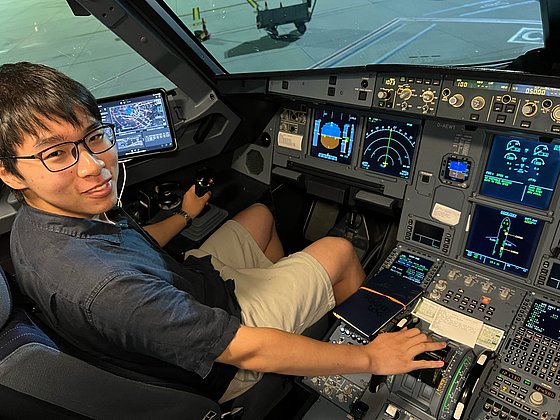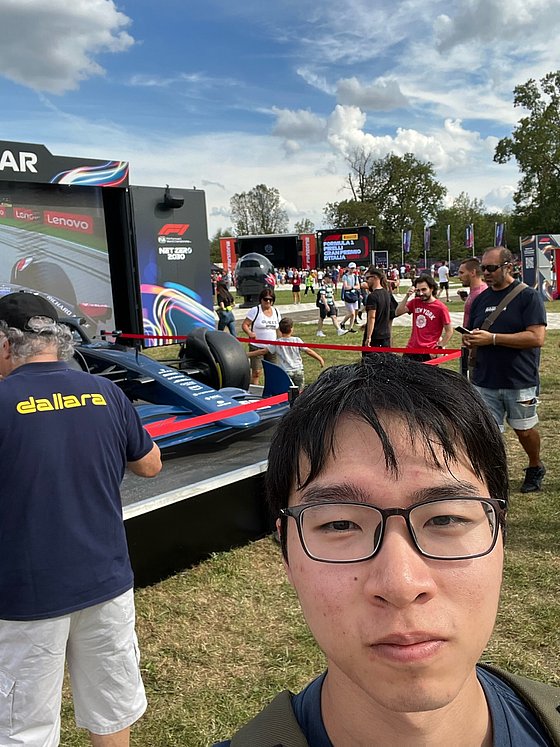Yicheng Han

Yicheng Han ist ein junger Forscher aus Hangzhou, China. Er ist Student der technischen Physik an der University of British Columbia und hat zuletzt in Kanada studiert.
ARRIVAL TIME
How was the arrival at the Institute?
It went very smoothly. I arrived in Wuppertal by train, and the other DAAD student Mark from Dublin helped me with the accommodation check-in, and showed me around the city.
How did you get accepted at the institute?
I applied through the DAAD RISE Germany program, which is a summer research internship in Science and Engineering undergraduate students from North American, British and Irish universities. And I successfully got matched with my supervisor Jannik Peters’ research project.
How did you get supported?
All the people in the institute are super friendly. Since I don't know any German, it's a bit challenging for me to understand the daily options in the university's cafeteria. However, the Ph.D. student helps by translating the menu for me. My supervisor, Jannik, is also very supportive. He ensures that I have everything I need (such as all the necessary documents and SIM card) before I come to Germany. Moreover, he is always available to help with any problems, whether they are work-related or related to daily life.
What do you like about TMDT, what don't you like?
I really enjoy the working environment here at TMDT, although I hope there could be more options in the cafeteria on Campus Freudenberg
SCIENCE/RESEARCH
What was new in your studies?
The multi-agent reinforcement learning is a completely new area for me. It’s also exciting to see how agent could develop communication skills through reinforcement leaning.
What did you learn?
I became familiar with the RLlib library, which we use for training the agents. Additionally, I learned how to utilize weights and biases to log the experimental results. Concurrently, I also gained knowledge of the emergent language in multi-agent reinforcement learning through reading research papers. At the same time, I also practice my Python coding skills.
What is the biggest difference between here and your home university?
I'm surprised at how cheap the student meal prices are at the canteen in BUW. At UBC, a meal would cost at least 9 euros.
What is the biggest difference between your hometown and Wuppertal?
My hometown is Hangzhou, China. I would say the most noticeable difference is the terrain. In Wuppertal, because of the valley, it's all ups and downs with plenty of slopes and stairs, while in Hangzhou, it's mostly flat.
LEISURE TIME

Where did you stay?
I stayed in one of the student residences offered by BUW on Max-Horkheimer-Straße. The room is very nice, and I have my own bathroom and kitchen. The location is also very convenient, as it's only a 15-minute walk to the Wuppertal central train station. Most importantly, the rent is much cheaper than in Vancouver.
What were your first german words?
Danke, Ja, Nein, Entschuldigung.
What was the best trip during your stay in Wuppertal?
Cologne, the Cologne Cathedral is definitely breathtaking. I also got the opportunity to travel to other European countries, and Paris is one of my favorite cities in Europe.
Have you ridden the Schwebebahn?
Yes! It's a really fun experience, especially when the cabin swings a little bit as people get on and off the Schwebebahn. Also, the scenery along the route is amazing.
What is the best food in Town?
I would say PrigThai, which is a Thai restaurant near Wuppertal Hauptbahnhof. The Pad Thai there is price-friendly and tastes good!
